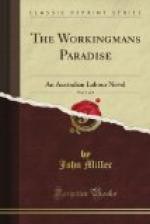“How would you get your daily?” enquired Geisner.
“Expand the weeklies into dailies simultaneously in every Australian capital,” said George, waxing enthusiastic. “That would be a syndicate at once to co-operate on cablegrams and exchange intercolonial telegrams. Start with good machinery, get a subsidy of 6d. a month for a year and 3d. a month afterwards, if necessary, from the unions for every member, and then bring out a small-sized, neat, first-rate daily for a ha’penny, three-pence a week, and knock the penny evenings off their feet.”
“A grand idea!” said Geisner, his eyes sparkling. “It sounds practical. It would revolutionise politics.”
“Who’d own the papers, though, after the unions had subsidised them?” asked Ned, a little suspiciously.
“Why, the unions, of course,” said George. “Who else? The unions would find the machinery and subsidise the papers on to their feet, for you couldn’t very well get every man to take a daily. And the unions would elect trustees to hold them and manage them and an editor to edit each one and would be able to dismiss editors or trustees either if it wasn’t being run straight. There’d be no profits because every penny made would go to make the papers better, there being no advertising income or very little. And every day, all over the continent, there would be printing hundreds of thousands of copies, each one advancing and defending the Labour movement.”
“It’s a grand idea,” said Geisner again, “but who’d man the papers, George. Could Labour papers afford to pay managers and editors what the big dailies do?”
“I don’t know much about managers, but an editor who wouldn’t give up a lot to push the Cause can’t think much of it. Why, we’re nothing but literary prostitutes,” said George, energetically. “We just write now what we’re told, selling our brains as women on the streets do their bodies, and some of us don’t like it, some of the best too, as you know well, Geisner. My idea would be to pay a living salary, the same all round, to every man on the literary staff. That would be fair enough as an all round wage if it was low pay for editing and leader writing and fancy work. Many a good man would jump at it, to be free to write as he felt, and as for the rest of the staff by paying such a wage we’d get the tip-top pick of the ordinary men who do the pick-up work that generally isn’t considered important but in my opinion is one of the main points of a newspaper.”
“Would you take what you call a ‘living salary’ on such a paper?” asked Connie.
“I’d take half if Josie—” He looked at her with tender confidence. The love-light was in her answering eyes. She nodded, proud of him.
“And they’d all publish my poetry?” asked Arty.
“Would they? They’d jump at it.”
“Then when they come along, I’ll write for a year for nothing.”
“How about me?” asked Ford, “Where do I come in?”




